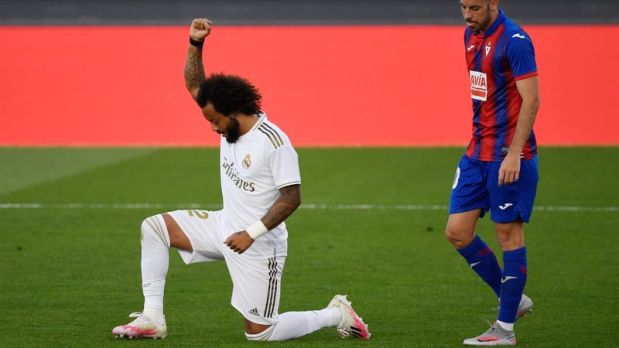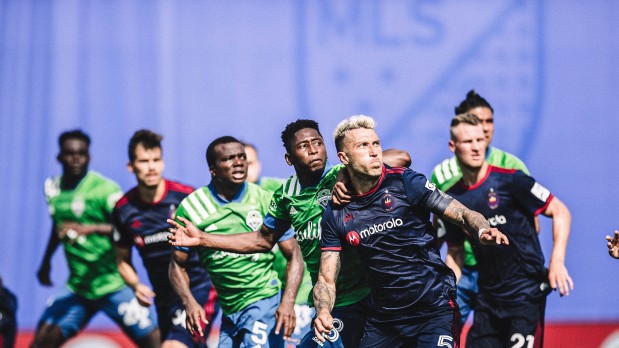If you’re an American, it’s hard to turn on the news these days without seeing a story on Black Lives Matter, or the palpable outrage felt across the country in the wake of the killings of black Americans like George Floyd and Breonna Taylor. Social justice has once again gripped the nation’s attention, and has sparked protests and gestures of solidarity around the globe.
When the English Premier League resumed play in June, the league announced that players would be wearing “Black Lives Matter” on the back of their jerseys in lieu of their names. All 20 Premier League clubs released a joint statement saying they were “committed to a global society of inclusion, respect, and equal opportunities for all, regardless of their color or creed.”

Several Premier League players were involved in discussions with the league and clubs to get people on board, including Leicester City’s Wes Morgan, and Watford captain Troy Deeney, who’s girlfriend helped design the Black Lives Matter badge to be worn. The decision to show solidarity in the midst of fiery protests in America, speaks to the progressiveness of the European soccer leagues, and shows their commitment to fighting racism in the sport.
Similar gestures have been made by players in Germany and Spain as well. Many players have decided to take a knee, wear black arm bands, and raises their fists to show support for the Black Lives Matter movement, including high profile stars like Jadon Sancho of Borussia Dortmund, and Marcelo of Real Madrid.

This in in stark contrast to the conversation around protesting for social justice in American sports leagues. Colin Kaepernick remains blackballed by the NFL for taking a knee in 2016, and Megan Rapinoe was admonished by U.S Soccer for taking a knee in solidarity with Kaepernick. Both of these leagues have had multiple opportunities to demonstrate their commitment to social justice, and have instead opted to look the other way.
Roger Goodell released a statement saying that the NFL was wrong in the way that they handled social justice protests previously, but that’s all he’s done so far. No apology to Kaepernick for his role in ostracizing him from the NFL, and no effort by the league or team owners to bring Kaepernick back. U.S. Soccer also continues to be defiant, not just when it comes to protesting during the anthem, but also with regards to equal pay issues for the USWNT.

Some American sports leagues have decided to take a more progressive stance. Major League Soccer teams have been taking a knee, raising their fists, and wearing T-Shirts showing support for Black Lives Matter. The NBA also announced that players would have the option to wear a social justice message on their jerseys once the league resumes play. However, we don’t see the same level of unity that we saw from the Premier League.
This is not to say that European soccer has fully addressed the plague of racism. Racist abuse towards black players is still very prevalent in Europe. Several players have spoken out about racist abuse recently in Italy, including black stars like Mario Balotelli, and Romelu Lukaku. Just this week in the Premier League, Crystal Palace forward Wilfried Zaha revealed that he had been subjected to racial abuse on social media. Police arrested a 12 year old boy from the West Midlands in connection to those obscene messages.

The reluctance of American sports leagues to take a firm stance on social justice is due in part to America’s dichotomy with protesting, and respecting the national anthem and American flag. There are many Americans who believe that taking a knee or raising your fist during the anthem is tantamount to disrespecting America. And those sentiments have been present long before Kaepernick ever decided to kneel.
In 1968, two American Olympic athletes, John Carlos and Tommie Smith, decided to raise their fists and wear black gloves during the national anthem which played during their medal ceremony. The two sprinters had won gold and bronze respectively in the 200-meter race. They kept their fists raised during the entire anthem, and also wore human rights badges on their jackets, as did Australian-silver-medalist Peter Norman.

The decision to raise their fists was construed as a declaration of Black Power, which did not sit well with Americans at the time. In the aftermath of the protest, Carlos and Smith were condemned by the mainstream media, and were subjected to widespread taunts and criticism. Smith was quoted as saying “If I win, I am American, not a black American. But if I did something bad, they would say I am a Negro. We are black and we are proud of being black.”
His quote still rings true today. American Sports Leagues are dominated by black athletes who are revered as heroes when they play well and help their team win. When they decide to speak out on social justice, or make a statement about black pride, they’re labeled as troublemakers, or told to just “shut up and dribble.”
In his autobiography Silent Gesture, Smith stated that the protest was not a “Black Power” salute, but rather a human rights salute. Today we see athletes like Kaepernick and Rapinoe continue to be vilified for protesting during the anthem in the same fashion.
Back to the NFL. Some may say “but Owen, look at what the NFL has done recently. The Washington Redskins decided to change their name and logo in response to social pressure from the recent protests. Doesn’t that mean anything?”
Yes it does. I applaud the decision that the Redskins made to finally change their name and logo. However, let’s be crystal clear. This decision had more to do with caving to financial pressure rather than social pressure.

The Redskins had been using their name and logo for almost 90 years. Plenty of time to think about how that name and logo could be offensive to Native Americans, which to me seems pretty obvious. Since taking ownership of the team in 1999, Dan Snyder has been pressured numerous times to change the name and has been defiant up until now.
“We’ll never change the name.” Snyder said in May 2013. “NEVER – you can use all caps.”
It wasn’t until just recently, when several major sponsors announced that they would cease their financial partnership with the Redskins if they didn’t drop their nickname, that the ownership changed their tune. FedEx, who owns the naming rights to their home field, was the main catalyst. I get that sponsors have significant leverage over sports teams, but they shouldn’t have all the leverage.

Unfortunately, that may be the reality we live in. If we want to see real change with regards to racism and social justice in American sports, we have to hit them where it hurts the most. In their wallets.





